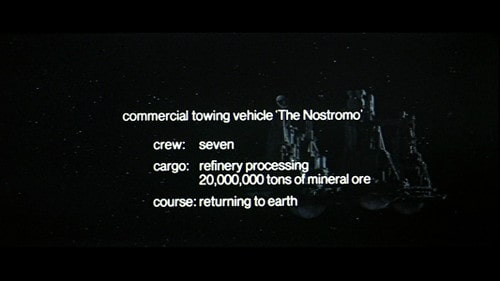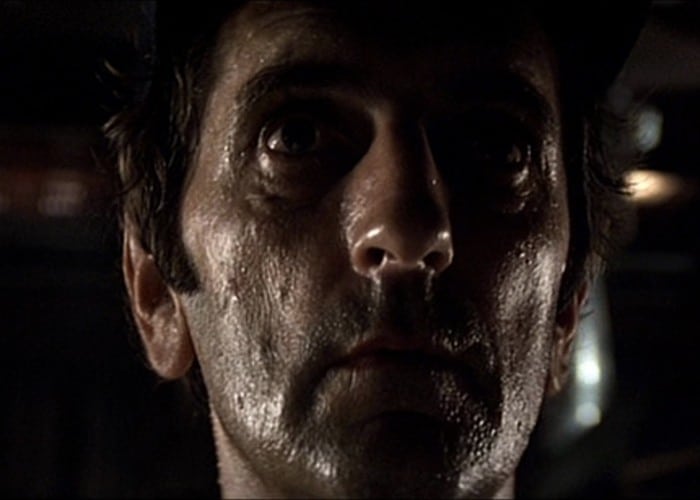In ‘Alien’ Horror Comes In The Form of Labor Exploitation
In space, no one can hear you scream. But, in space, can anyone hear you work? Ridley Scott’s sci-fi masterpiece asks that question.

According to Alien’s marketing, “in space, no one can hear you scream.” But, in space, can anyone hear you work? Ridley Scott’s sci-fi horror classic gave the world a terrifying alien, a badass female protagonist, and a lot of gooey, reproductive body horror. But, classic horror elements aside, Alien also serves as a critique of labor exploitation and how capitalistic structures of power turn human beings into cogs in the corporate machine.
The film’s characters are all literally part of and inside of a corporate machine: the commercial towing vehicle Nostromo, which is bringing back 20 million tons of mineral ore to Earth. In the opening moments, the camera is static as the Nostromo flies over it, revealing a massive, seemingly neverending ship. The Nostromo is the property of Weyland-Yutani, the massive corporate entity of the Alien universe. It is a giant metal contraption that carries resources and human life. The crew makes sure it functions and fulfills its duties for the corporation, while the machine, in turn, provides life-sustaining oxygen and cryosleep chambers.

Inside of the Nostromo is an established social hierarchy based on rank and how much money that rank gets you. At the bottom of this hierarchy are Brett (Harry Dean Stanton) and Parker (Yaphet Kotto). They are the two blue-collar workers of the ship, maintaining mechanical systems and providing repairs when needed. The rest of the crew are higher ranked, helping navigate the ship and its technical systems. They are given cushy seats on the flight deck and Nostromo-branded jackets. They give orders and type on computers, which are important duties to help the ship work. But, despite the work that Brett and Parker put in to make sure the corporation’s machine is functional and flying, they are given the smallest portion of the money. Brett and Parker bring up the bonus situation as one of the first pieces of dialogue. They want full shares but are met with “you get what you’re contracted for like everybody else.”
Further, the actual physical bodies of Brett and Parker set them apart from everyone else. Brett is wearing a Hawaiian shirt and a trucker hat, an outfit that could be associated with a lower class. He does not wear the flight suit of the rest of the crew but the clothes of a laborer who needs to be comfortable while working on ship repairs. Parker, while also in similar clothing, is the only black person on the ship and is relegated to a laborer position, working in the bowels of the ship. His difference is marked by both his appearance and his status on the Nostromo. While he is vocal about his desires to be equal to the rest of the crew, he is constantly shot down or ignored. Within Scott’s examination of capitalistic power structures lies a critique on race as well and how those who are not white are even further exploited for their labor; Parker should work for less money and be happy about it.
Regardless of social standing on the ship, every crew member is expected to sacrifice themselves for the greater vision of the corporation. When the ship picks up a transmission of unknown origin, they are taken out of cryosleep and expected to investigate the source, despite just being a commercial operation. When the captain explains the situation, Parker is the first to pipe up and ask about compensation for the detour since a rescue mission is not in his contract. He tries to fight for his worth and against the corporation’s attempts to exploit his labor further. But, contracts have foiled him again because, according to the corporate cyborg Ash (Ian Holm), there’s small print that indicates that if a transmission of intelligent origin is found, they are required to investigate or else all compensation is forfeit.

While Kane’s (John Hurt) iconic chest-bursting demise is the first onscreen death, Brett is the first to die at the hands of the grown-up Xenomorph. He is alone, quietly treading through the ship searching for Jonesy the cat. While looking for the sneaky feline, Brett is surrounded by giant machinery that looms in the shadows, reminding him of his place on the ship. He weaves throughout dangling chains from the ceiling, as if he’s done this before. In one of the quietest and more introspective shots of the film, Brett leans his head back and lets water fall onto his face. He opens his mouth to take a quick drink and for a moment seems to be ruminating on the situation and his position in the unfolding events. Yet, as soon as this moment begins, it ends with his violent death. He dies amongst the machinery he was tasked to operate and care for, reminded in his final moments that he is just a pawn for Weyland-Yutani’s bigger schemes.
Over the course of Alien’s runtime, six crew members of the Nostromo lose their lives at the hands of the Xenomorph. But it is not just the creature that kills them; it is their contractually obligated duty that does, too. The lives of these six laborers are inconsequential to what Weyland-Yutani could learn from the alien. Their lives are expendable, and what is scarier than that? In Alien, Scott not only creates an effective horror movie, but also a subtle and equally horrifying critique on corporate exploitation of employees. Human lives mean nothing compared to what capitalism declares is the greater good, both in the world of Scott and in the world of today.
